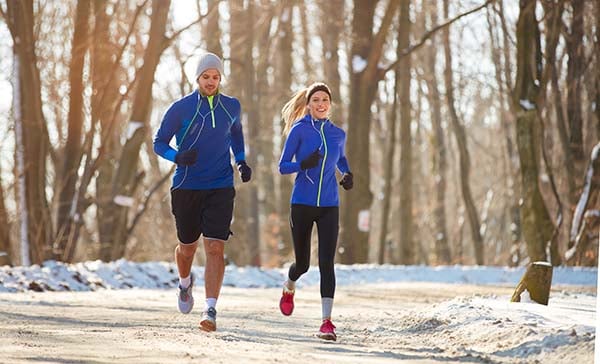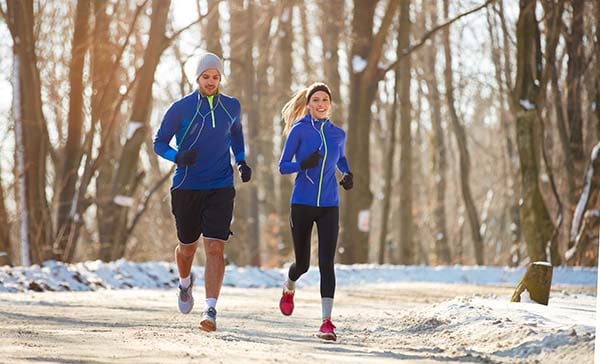“Chilly weather workouts can amp energy, burn more calories, and improve your mood.” -Womenshealthmag.org
As the weather gets colder outside, do you debate heading out for that run or recreation? Are cold-weather workouts good for your health or should you avoid them? Women's Health magazine claims that exercising out in the cold has health benefits over warm weather workouts.
One argument is that cold weather makes you work harder which burns more calories and releases more endorphins. Invigorating cold weather can also stimulate the senses, while heat and humidity drag you down. The publication also states that race times are faster in cold weather and faster runs burn more calories. The National Personal Training Institute agrees with these claims and adds the benefit of a stronger heart, lungs, and circulatory system as well as a boost in Vitamin D.

Research shows that we shouldn't halt our winter exercise routine. In fact, we may be able to continue to exercise outdoors even in the winter. When doing so, however, some safety precautions should be taken.
First, always check with a doctor before starting an exercise routine. The Mayo Clinic also recommends if you have asthma, heart problems, or Raynaud's disease to check with your doctor before exercising in the cold. Your doctor may provide special precautions related to your medication or condition.
How to stay safe while exercising in the cold winter months:
1. Dress appropriately
- Cover your extremities- Your fingers, nose, and ears are the first to freeze. Keep them covered.
- Keep your clothes dry- damp clothes increase heat loss. Moisture-wicking clothing closest to your body will help to repel sweat. If necessary, wear a water resistant cover over your clothes and change wet clothes promptly.
- Wear shoes with traction, especially in slush and ice.
- Don't over dress. Exercise quickly increases body temperature. Wearing layers allows you to shed some articles of clothing once you warm up. Warming up indoors may eliminate the need to shed that first layer.
2. Drink water
This may seem obvious, but sometimes individuals drink less when it is not hot out. You still need to hydrate, especially when exercising.
3. Be aware of daylight
Winter months have less hours of sunlight. If working out in the dark; wear reflective clothing, find a well-lit area, or bring your own lighting. It’s also safer to exercise with a buddy, especially after dark.
4. Know your weather
Ice can be slippery and wind can penetrate clothing. If the morning weather is too unpredictable, you may want to move your workouts to your lunch hour when conditions are usually milder.
5. Know the warning signs of frostbite, hypothermia, and heart attack
Extremely cold weather brings with it extra precautions. If you plan to exercise outdoors in very cold weather, study up on these warning signs.
Frostbite - Look for numb, swollen, or a change in color to your skin (typically gray or yellow). If these signs present themselves, submerge affected areas in room temperature water and seek help immediately.
Hypothermia - When your body temperature drops below 98.6°F you may have impaired motor skills and speech. If the symptoms progress, one may become weak with shallow breathing. Irrational behavior, dizziness, and confusion may also result from this condition. Move to a warmer location and seek medical help.
Heart Attack - Cold weather causes blood pressure to rise, increasing the potential of heart attacks, particularly for those with cardiovascular disease. Warning signs include: pressure or pain in the chest, shortness of breath, cold sweat, feeling faint, or feeling sick to the stomach. If you notice these warning signs call 911.

Staying physically active is important all year round. If you need to find an indoor option for a few months, look for gyms that allow you to pay for single days, weeks, or months without signing a yearly contract. However, if you are cleared to do so, follow these tips and enjoy the vigor of the cold. It just might motivate you to move more or run faster.
Above all, remember why we stay fit. Having a strong physical body gives us the strength and endurance to do what God has called us each to individually. Work diligently unto the Lord all year round. As you draw close to Him, He will draw close to you.





